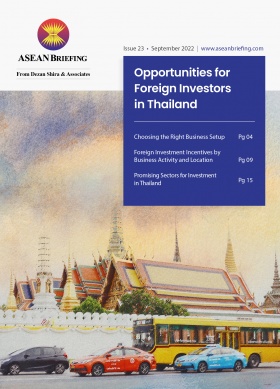Thailand Opens First Digital Free Trade Hub
Thailand has launched its first digital free trade hub in partnership with Alibaba, as the country looks to upgrade its logistics and e-commerce sectors.
The hub is a free trade area in Thailand’s Eastern Economic Corridor (EEC) designed to facilitate cross-border e-commerce between Thailand and China. The Thai government developed the hub in partnership with the Chinese technology giant as part of the latter’s Electronic World Trade Platform (eWTP), an initiative to promote international e-commerce.
If successful, the digital free trade hub will allow consumers in Thailand and China to buy products from each other’s markets more easily and quickly. The launch of the digital free trade hub is part of Thailand’s efforts to position itself as one of Southeast Asia’s key logistics centers for trade and e-commerce.
What is the digital free trade hub?
The digital free trade hub, sometimes referred to as the Smart Digital Hub, is a zone of 40,000 square meters that benefits from special rules for Thailand-China cross-border trade. The hub is populated by bonded warehouses storing Chinese products to be sold in Thailand, as well as warehouse housing Thai products to be shipped to Chinese consumers who buy them through Alibaba’s platforms.
The hub offers both expedited customs procedures and physical proximity to expedite trade. In a bonded warehouse, a dutiable Chinese product will be stored in Thailand. Planners designed these warehouses to be fully automated.
Taken together, planners say that the amount of time needed for Thai consumers to receive cross-border e-commerce orders from China will be reduced from 10 days to three days. If successful, expedited shipping will make Chinese products more appealing and more accessible to Thai consumers.
In a statement, Song Juntao, secretary general of eWTP, said that the hub marks the successful replication of China’s cross-border e-commerce model. Over the last decade, this model has grown in popularity in China as it allows consumers to rapidly receive international purchases through bonded warehouses located on Chinese soil.
From plan to reality
The digital free trade hub came into operation on December 8, 2022. It gained extra international attention following its launch when Alibaba’s founder, Jack Ma, visited the country in January 2023, making a rare public appearance.
The project initially began in 2018 when Ma signed four Memoranda of Understanding with the Thai government on trade, investment, and support for e-commerce and tourism. Alibaba and the Thai government previously signed a letter of intent in 2016 to cooperate on e-commerce.
At the time, Alibaba committed to investing 10 billion baht (US$302.8 million) to develop the hub. It was originally supposed to be fully operational by 2019, but its launch was delayed, including by the COVID-19 pandemic.
Alibaba launched the first international hub under the EWTP initiative in Malaysia in 2017 with a focus on developing a logistics hub by the Kuala Lumpur International Airport. Within China, Alibaba has also established eWTP partnerships in Hangzhou, Yiwu, Hainan, and Hong Kong.
Investing in Industry 4.0
The hub is run in partnership between the EEC Office of Thailand, Thai Customs, and Alibaba. The EEC is a special economic zone comprised of three Thai provinces at the forefront of the Thai government’s ambitions for economic development – Chonburi, Rayong, and Chachoengsao.
Logistics is one of many industries that the Thai government is seeking to develop in the EEC. According to Thai Customs, the eWTP Thailand platform will realize the digital supervision of the hub from the entry of goods into the territory to the final distribution to consumers.
As part of the agreement to build the digital free trade hub, Alibaba committed to sharing technology and processes with Thai stakeholders. This is in support of “Thailand 4.0”, which is Thailand’s industrial strategy to transform into a tech and innovation-led economy.
The digital free trade hub will leverage Alibaba technologies, including Cainiao Network, the company’s logistics platform. These technologies will be used to streamline trade and digitize the customs process.
Promoting international e-commerce
The digital free trade hub stands to benefit Chinese exporters to Thailand through the latter’s adoption of a bonded warehouse model, as Chinese goods will become more readily accessible. At the same time, Thai products will be featured on Alibaba’s platforms and shipped more efficiently to China, thereby increasing market access in Asia’s largest economy.
In 2018, Ma emphasized that the hub would help Thai businesses sell their products in China, such as jasmine rice and tropical fruits, which can be shipped within 24 hours of harvesting.
In the long term, the digital free trade hub’s greatest benefit may be its ability to offer Thai Customs and other stakeholders valuable experience in digitizing customs and logistics processes. Such an outcome could lead Thailand’s trade, logistics, and e-commerce systems to become more competitive and efficient in the years ahead.
About Us
ASEAN Briefing is produced by Dezan Shira & Associates. The firm assists foreign investors throughout Asia and maintains offices throughout ASEAN, including in Singapore, Hanoi, Ho Chi Minh City, and Da Nang in Vietnam, in addition to Jakarta, in Indonesia. We also have partner firms in Malaysia, the Philippines, and Thailand as well as our practices in China and India. Please contact us at asean@dezshira.com or visit our website at www.dezshira.com.
- Previous Article A Guide to Taxation in Singapore
- Next Article A Guide to Taxation in Cambodia









